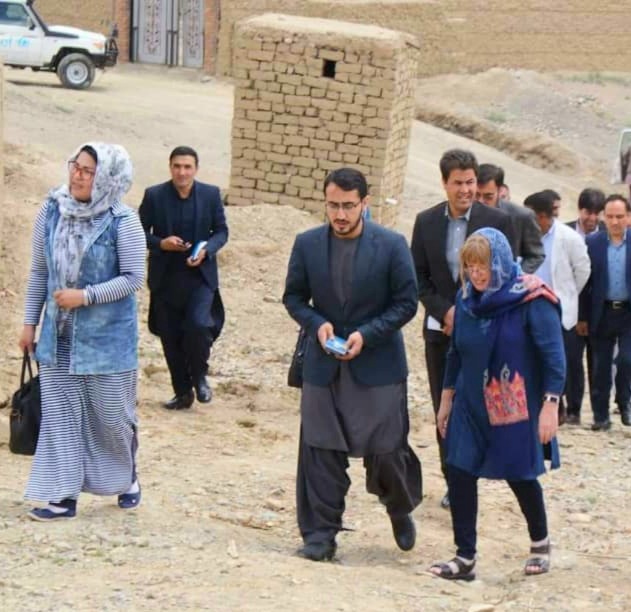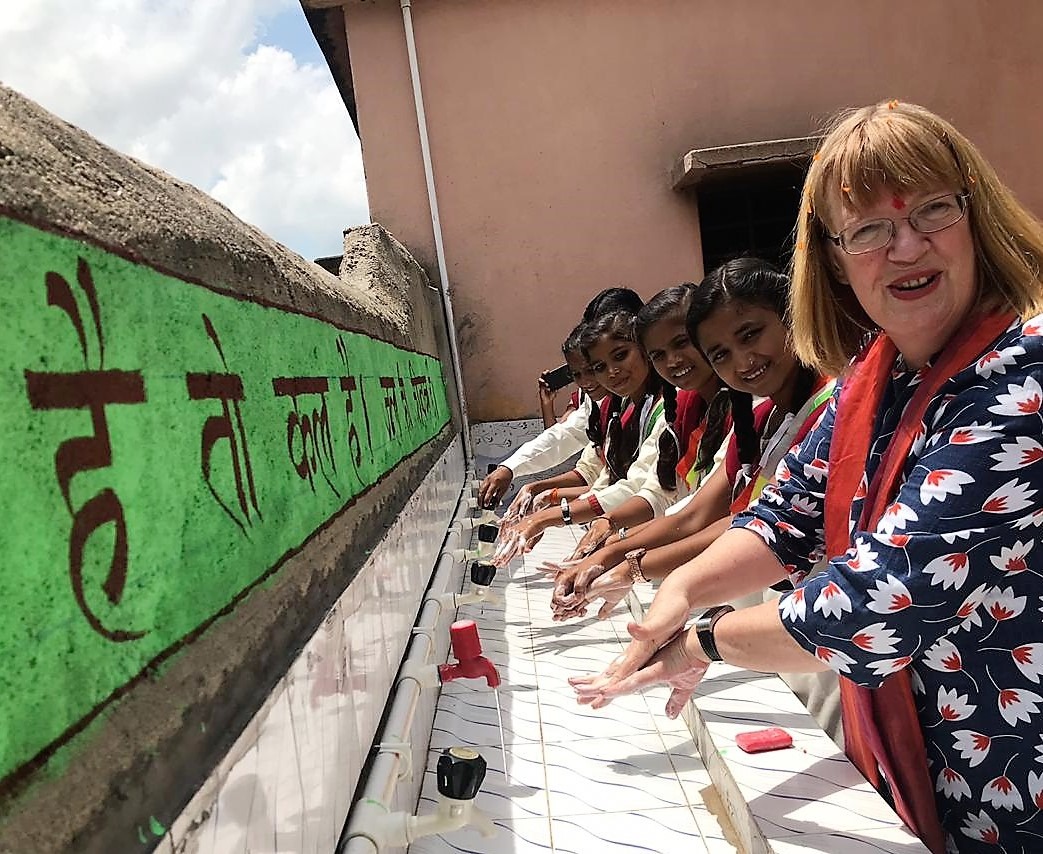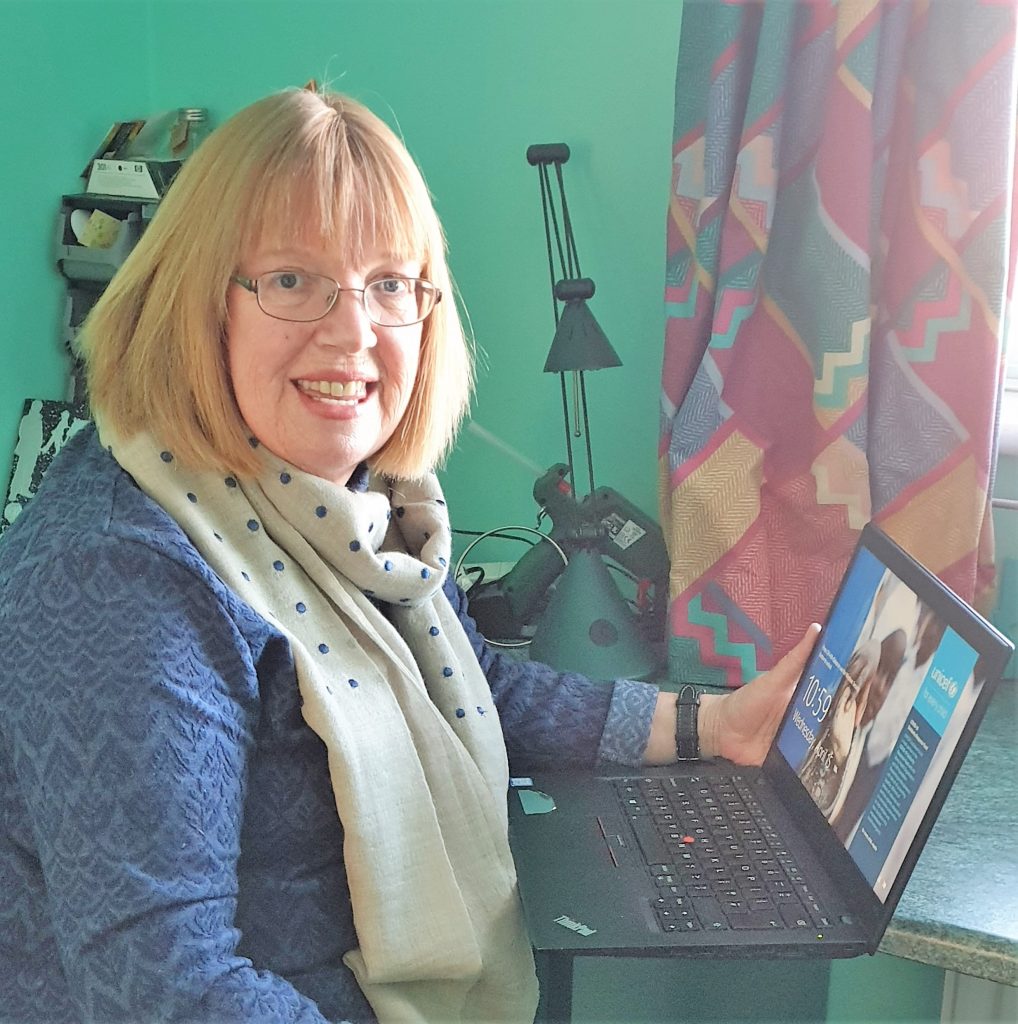
Therese Dooley, UNICEF South Asia WASH Adviser
Carlow woman Therese Dooley has dedicated her career to the humanitarian and development sector, spending over 30 years honing her speciality – water, sanitation and hygiene or WASH. She has been based in South Asia for the last five years, during which time she has worked on UNICEF programmes in Afghanistan, Bangladesh, Bhutan, India, Maldives, Nepal, Pakistan and Sri Lanka. This complex role has been made more difficult than ever by COVID-19, which has sadly now culminated in a huge surge of infection across the region. It comes just as Ireland begins to make its way out of the crisis.
Therese gave UNICEF Ireland her reaction to latest developments in the region.

WASH specialist Therese at work in Afghanistan © UNICEF/Dooley
Can you describe latest developments?
COVID-19 cases are rising at an alarming rate across South Asia. The region now accounts for almost half (49%) of the world’s new cases (as of 4 May). The virus is also affecting more people across all age groups, including children and infants.
India is in the grip of a ferocious second wave which is almost four times the size of the first wave and the virus is spreading much faster than previously. On average, there are more than two deaths every minute. Nepal, Sri Lanka and the Maldives are also severely affected.
UNICEF is very concerned about this deadly new surge. The spread of this surge has not just nation-wide, nor just region-wide implications – it has the potential to reverse hard-earned global gains against the pandemic.
What is causing the upsurge?
This is the second/third wave to hit many of these countries, and similar to what we saw in Ireland just after Christmas. Lockdowns are very difficult and in economies where there are no social welfare systems and people earn their wages day-to-day they are even more difficult to sustain over a long period as people need to work to feed their families and lockdown is a privilege they cannot afford.
Coupled with that, many of the risk behaviours return as we become more complacent – we still need to follow COVID safety guidance and protocols. We still need to wear masks (and double masks if needed), practice physical distancing, and ensure we wash our hands with soap as often as possible. There are also very low levels of vaccination in most South Asian countries (less than 10% in India, Sri Lanka and Nepal).
What are the underlying factors?
As with any Public Health emergency the poorer and more vulnerable groups in society are affected the most. Across South Asia we have large numbers of people who live in very high density and over-crowded areas, often with little or no access to resources to protect themselves, their families or the wider community. Think of Ireland in the 1940/50s, where many families lived in the same house and diseases such as TB spread rapidly and wiped out entire families. The opportunity to isolate or quarantine is not there and access to basic services like health, water and protection is greatly reduced.

Handwashing with school girls in india © UNICEF/Dooley
Who is worst affected?
Vulnerable populations are most at risk but this virus does not respect boundaries, postal codes, social grouping, caste or creed – it affects everyone
Nepal now has the highest effective reproduction rate in the world, and has reported a 25 per cent surge in COVID-19 cases among children and adolescents.
In Sri Lanka, the number of daily new cases has never been higher (nearly 2000 as of 3 May) and is increasing sharply. Initial WHO modelling projects a 10-fold increase in daily cases in the next few weeks if the infection trajectory continues unchecked.
Maldives is witnessing an unprecedented peak in cases. At 883 (3 May), the tiny island nation has one of the highest daily cases per million people in the world.
As COVID-19 cases have increased, the direct impact on children in contracting the virus has also increased. Fortunately, most cases of COVID-19 in children are mild. Very few serious cases required hospitalisation. However, the knock-on effect on children should not be under estimated. UNICEF is greatly concerned about the impacts of the new surge on children. Children are losing parents and caregivers to the virus, leaving many of them destitute, without parental care.
In addition, as resources are diverted and services become saturated, the essential health services that children and mothers rely on – including routine immunisation services and treatment for diseases like pneumonia – are once more at risk of being compromised, if not shuttered entirely.
Children are becoming witnesses to scenes no child should see – which is taking an enormous toll on their mental health. Yet lockdowns have shut them off from their vital support networks.
Until we are all safe – nobody is really safe.
What are the priority needs right now?
UNICEF has sent critical life-saving supplies to support the response in many of the countries of South Asia.
In India, we have 3,000 oxygen concentrators, testing kits and other critical equipment in place. Personal Protective Equipment (PPE) is on the way, and UNICEF is planning to send more oxygen concentrators soon.
We continue to support Governments in ensuring that critical services for the most vulnerable children are not interrupted providing basics like PPE for people working on children’s phone-in helplines and ensuring the continuity of social services.
UNICEF is also supporting several COVID vaccination and isolation centres across the region. We are very thankful for the support and compassion of the international community. We need the compassion and contribution to continue until we see the end of the pandemic. We need support for the urgent delivery of additional testing equipment, hygiene supplies, oxygen products and funds for lifesaving COVID-19 interventions as the health systems struggle to cope with the massive increase in patients. We also need support to ensure vulnerable children in need or care and protection are reached as a priority.
Working in WASH, is a pandemic like this something you would have feared for the region?
In the past I have been involved in Cholera, SARS and the Ebola outbreaks, but nothing to this scale and while we work with Governments on emergency preparedness in South Asia these would mainly relate to earthquakes, droughts or cyclones. I don’t think anyone was truly prepared for this global pandemic and its impact on all of us.
Are there lessons from the first wave of the pandemic that your team can take and apply as they tackle the second wave? Are countries in a better or worse position to respond?
Absolutely, we have lots of lessons from the first wave including the establishment of systems and processes, key messages and responses. Frontline workers are fully vaccinated and we have a better understanding of where the hotspots or priority areas are for both interventions and control of the spread of the disease. Information management systems are also in place and staff have been trained on key issues. But the sheer scale of the crisis is unprecedented and the health care systems are just overwhelmed.
What do you see as the key risks for South Asia?
Beside the immediate response needs and getting people the necessary health care, the biggest risks are really the long term social and economic impacts this pandemic is having in all countries in South Asia. The demands on the health and other social services is huge and the ability of Governments to re-invest and rebuild some of these systems is limited. The biggest risk is that we will lose all the gains we have been making in improving the lives of children and their families over the past two decades.
What do you see as the way out of this crisis?
Three things:
– life saving equipment, oxygen, IPC/PPE etc and services
– Vaccines, vaccines, vaccines
– Child protection services

Working from her Carlow base, Therese says it has been challenging to feel so far away from her team and organises her day so that she keeps Nepal time © UNICEF/Dooley
How are you navigating the current crisis personally?
I returned from Kathmandu in April and am now working remotely from Carlow. I start very early in the morning so that I keep the same schedule as my colleagues in Nepal. I am fine.
While I am privileged to be working safely from home its also frustrating as you want to be closer to the teams in the affected countries… but then you realise everyone there is also working from home also. Many of our staff have been affected by the virus both personally and their families and we try to support them as best we can. Hopefully we will all weather this storm together and support each other along the way.
For media enquiries contact aedin@unicef.ie
To read more about the crisis in South Asia click here
To read more about the immediate response to the crisis in India click here
To donate to UNICEF’s India appeal go here

